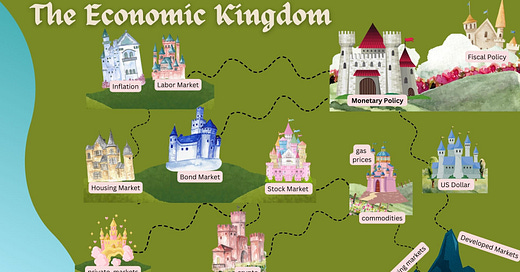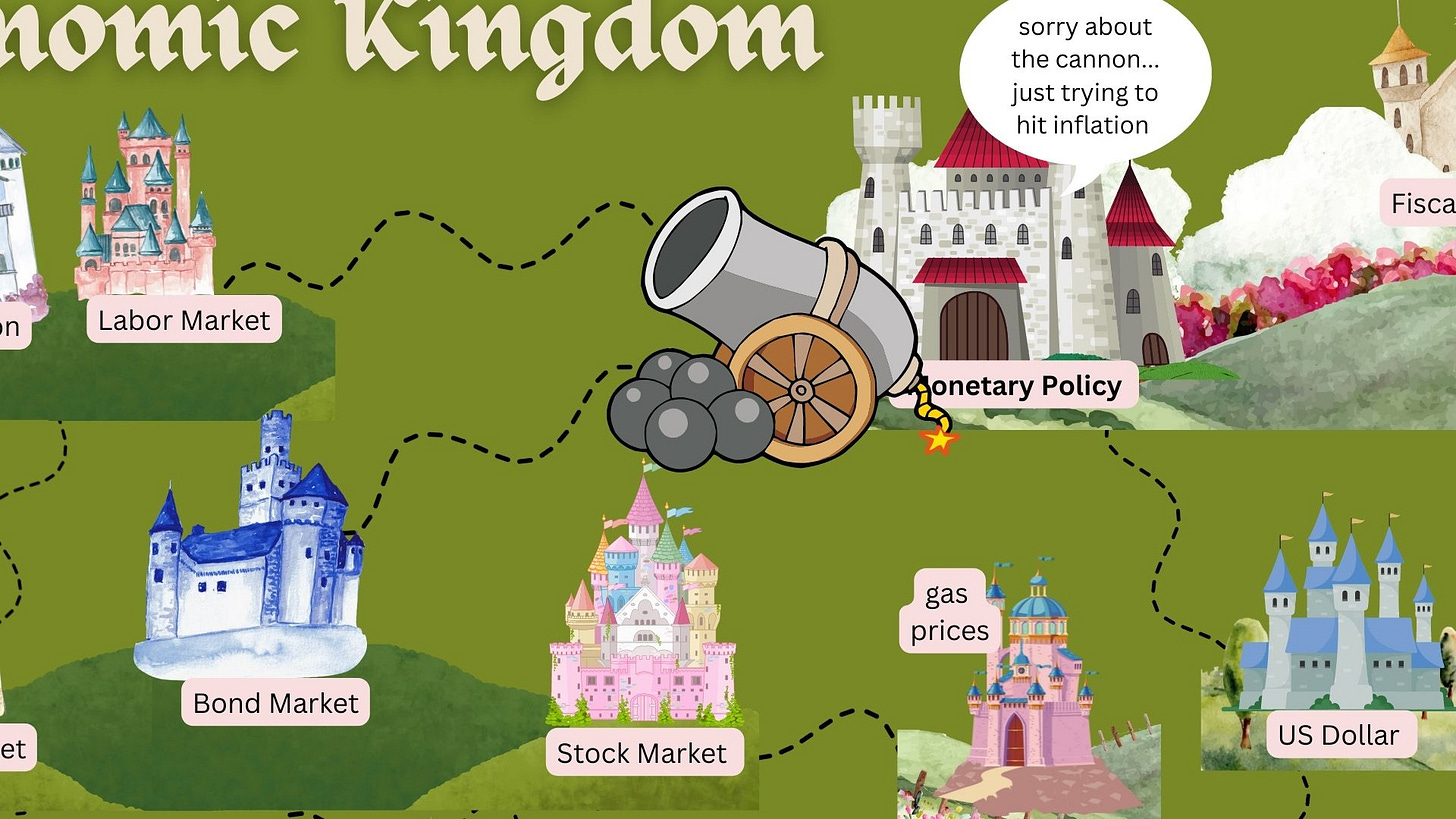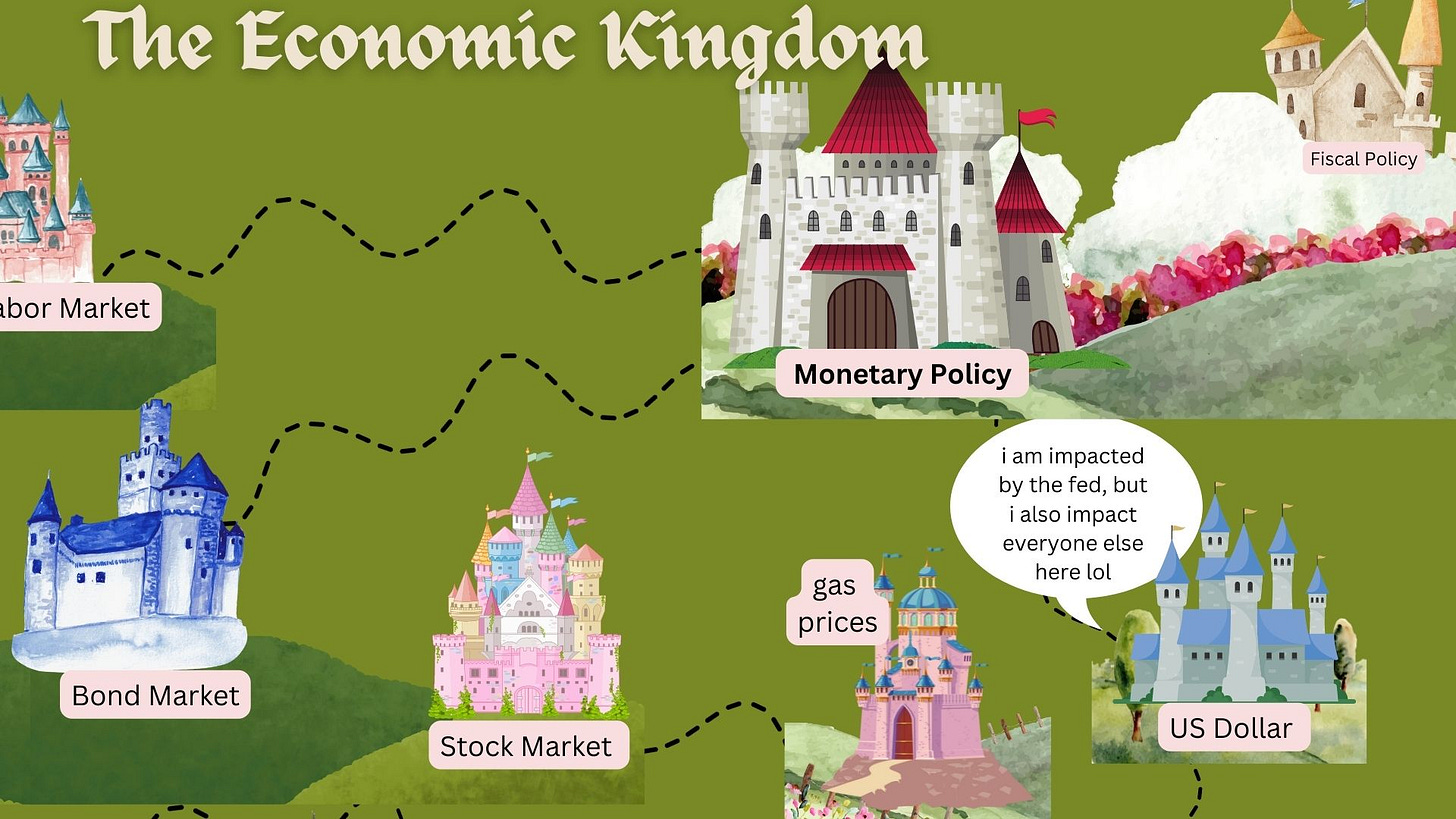mapping it all out
I was featured on Planet Money this week, and Marketplace last week! I also was honored to speak at FutureProof - thanks to AdvisorCircle for hosting!
This is the Economic Kingdom.
Monetary policy is the ruler of the kingdom - the decrees set inside that castle impact everyone in the land.
Monetary Policy Kingdom has the dual mandate of price stability and maximum employment - and they will use different tools to keep that side of the kingdom in line, like raising rates.
However, when Monetary Policy Kingdom uses that tool, it does impact lands such as the housing market, the stock market, etc - but it actually strengthens the realm of U.S. dollar, which in turn impacts neighboring lands, such as emerging markets and developed markets.
This is the story of the Economic Kingdom and the secret weapon of dollar strength.1
Tightening Monetary Policy
The Federal Reserve meets next week to discuss how their monetary policy path and right now, it’s seeming like they will raise rates by 75 bps. Jerome Powell had a chance to shoot that down at CATO, and he didn’t.
Of course, after the recent CPI print, they have all the ammunition they need to raise rates by 75 bps. There was even speculation of them loading up to 100 bps.
And maybe they will.
But what’s terrible about this tool (as so many have said) is that they are firing cannons into all the neighboring castles in an attempt to get them to stop spending. Destroying demand when really, the supply chains between the lands needs reinforcement.
Broad-Based Inflation
The recent CPI print came in hotter than expected, and pointed to broad based inflation - it’s no longer energy markets driving the inflation numbers, but food and services inflation. With moderating retail sales, this is increasingly not a demand problem, but increasingly seemingly like a supply-side issue. What this print underscored was how inflation moves throughout the economy, but parts of it are fuzzy.
Corporations are passing costs on: As I wrote about last week, energy prices are the common denominator to everything - and corporations have passed through a lot of costs to consumers, as Liberty Street Economics highlighted. Inflation.
Pressure from jobs: The labor market is still tight as evidenced by jobless claims, corporations are still seeking workers, which puts upward pressure on wages, impacting corporate cost-profit models as well as how people spend money.
Also, rents are confusing: With rents, the whole model of rent in CPI is a bit floofy, for lack of a better word. As Matt Klein said “The rent inflation reported in the CPI (including the M/M number) is ~90% a story about what happened last year, not current conditions.”
And now everyone is asking - “okay wow, so the Fed is going Fast and Furious to battle inflation because they sat on their hands too long last year - but are they going to go way too goblin mode here and mess things up more by *overreacting*?” The Fed now has to battle services inflation and food inflation - which are likely supply side issues, not really rate-hike-cannon-shooting problems. We need more things, not less buying.
I liked this from Alan Cole on how inflation is moving throughout the economy -
Our inflation reads lately have shown the limitations of micro-based inflation explanations ("X is happening in Y sector") relative to macro-based ones ("nominal incomes are high, and the money will be spent on something.") You may get a reprieve from X in Y sector, and that's good! But it doesn't stop the overall inflation story. The people who previously had to spend their ample nominal incomes on overcoming X will simply put those incomes towards Y2 sector, revealing bottleneck X2.
And this bottleneck aspect is important - because right now, the supply chain is in full bullwhip mode.
Shortage to Glut
The WSJ published a story on Scotts Miracle-Gro, a fertilizer company, and their path from not having enough to having way too much -
They had stocked up on merchandise of all sorts before realizing that consumer spending patterns shifted as the pandemic eased, leaving them with bloated inventory that would take months to whittle down.
But we still see so many wobbles in the supply chain - the aviation crisis, the railroad strikes (which were thankfully avoided as workers got the medical care and time off they deserve) - it’s still so fragile.
The World Bank published a report titled “Is a Global Recession Imminent” highlighting fragility of supply chains but also the broad economy, which basically boiled down to “lol yeah totally imminent, just look at history, and also around you” but they also underscore something really important - as the Fed tightens monetary policy in order to battle inflation, the dollar grows stronger - which has global consequences.
U.S. monetary policy is global.
The Secret Weapon of a Strong Dollar
This global impact is well-known, but a paper Getting to the Core: Inflation Risks Within and Across Asset Classes highlights how important the U.S. dollar is right now.
They discuss how “real” assets such as stocks and commodities do okay in an energy inflation regime, but falter when core inflation is high - “the only "real" hedge appears to be the U.S. dollar” as Nikolai Roussanov explains in his thread.
The dollar is strong when core inflation is up, as safe haven status and a result of tightening monetary policy, but also because the value of ‘core goods’ increases.
This aspect of core inflation is also what wrecked the concept of the 60/40 portfolio, because both stocks and bonds are getting hit right now.
Basically, the dollar is king, especially in the current macro regime.
Impact on Emerging Markets
But a stronger dollar impacts *everyone*
Just for a few examples, as China and the US diverged in monetary policy path, the renminbi substantially weakened, which puts China’s central bank in a tough position. The yen has been in free fall all year as Japan keeps the brakes on their own easy monetary policy. And of course, the euro and the dollar achieved parity.
What the dollar does (a function of the Fed monetary policy the Fed) impacts what other central banks do. From Reuters -
"With the risk of the Fed that possibly could go a full point on Wednesday and with the Japanese holiday on Monday ... Any intervention (from the Bank of Japan) now could be crushed by a Fed decision."
The stronger dollar is a “secret” weapon in the Fed’s monetary policy toolkit. U.S. Treasury yields are soaring as the market reprices the Fed’s hiking path, with expectations that rates would tick up to 4.42% in 2023 and *remain* there.
That of course creates a stronger dollar, which can create a dollar doom loop, as coined by Cheap Convexity, and put the hammer on trade and manufacturing creating pressure on the entire global economy.
Domestic corporations get hammered too. We saw the flashing red FedEx bell this week, with their CEO calling for a worldwide Recession.2
I highlighted this last week, but I think it’s important. As Claudia Sahm said -
Fed rate hikes causing the dollar to skyrocket should be half of the questions to Jay at the next presser. The US is spending billions of dollars to support the war effort Ukraine, while our monetary policy is crushing Europe and emerging markets.
Basically, the dollar is a secret cannon, firing on the rest of the kingdom as the Fed raises rates and shrinks the balance sheet - it's a consequence of domestic monetary policy having a globalized impact.
The dollar could lose some strength soon according to Simon White from Bloomberg and Zoltan Pozsar thinks it will essentially implode, but over the long run, Perry Mehrling highlights the powerful nature of the USD (really, the system that it exists in) -
Credit is not a bug. It's a feature. Outside money, which is like inventories of gold or something like that, is never going to be a good money. Inside money is the money that makes the world go around, it's credit money. And so you need credit in order to make that go, creditworthiness, and the best credit is money.
But back to the World Bank report -
If the degree of global monetary policy tightening currently anticipated by markets is not enough to lower inflation to targets… additional tightening could give rise to significant financial stress and trigger a global recession in 2023… (which) would also translate into a sharp decline in growth in EMDEs
The U.S. dollar probably won’t stop the Fed’s hiking path, but it is important to consider the broad consequences it has, including the pressures placed on other countries. The ‘secret’ weapon of the kingdom is one of the most powerful tools.
The Celebration of the Digital and the Physical
I really liked this tweet from Hank Green - although he was talking about being able to buy Fake Karens to yell at people, there is so much truth in the last question - “you’re just supposed to choose which bits seem real to you?”

When I wrote about Vibecession, there was a river of reality, and then there was a river of vibes! And they run side by side, because often times what we consider to be ‘reality’ is influenced by hard metrics, but it’s also influenced by our interpretation/perceptions/expectation around what that reality is meant to look like.
That’s the funny thing about the Economic Kingdom. It’s the harshest form of reality, because it matters - what the dollar does matters, when the housing market turns matters, how stocks move matter. But one thing that is so incredibly bizarre (and is true across all disciplines) is that it’s all based on theory, on the past, on what-has-already-happened-so-it-will-happen-again-ism.
I was talking to someone yesterday and they said (I am paraphrasing) but “the only true science is poetry”. It’s the application of language in a humanistic way, an interrogation of the real and the beyond, a way to make sense of the world - as Goethe said.
“Science arose from poetry, when times change the two can meet again on higher levels as friends.”
The lines blur between what things mean and what they are - and even with real world consequences like the dollar, it’s increasingly difficult to parcel out *the why* (which is ironic, as we have more information and data than ever). To make this even more esoteric, The Restaurant at the End of the Universe
“There is a theory which states that if ever anyone discovers exactly what the Universe is for and why it is here, it will instantly disappear and be replaced by something even more bizarre and inexplicable. There is another theory which states that this has already happened.”
Other Things This Week
The Ethereum merge was successful!! Patagonia, the uniform of capitalism, is given away to fight climate change. Figma potentially sells to Adobe for $20b, Adobe subsequently lost $30b in market cap. Uber got hacked. Storms could impact the stock market. Fred Franzia, a man who understood wine markets like no other, passes. Janet Yellen collects rocks. Blackstone is collateralizing Leonard Cohen songs. The culture is now the product. All that and more in my weekly Notion roundup.
Newsletter Subscriptions
The goal of my newsletter is for it to *always* be free - but there is work that goes into writing, of course! If you think the content is valuable or would like to buy me a coffee once a month :-) I would sincerely appreciate your support.
There are three options:
The annual subscription: $110 annually
The standard monthly subscription: $10 monthly
Founders club: $220 annually or any other amount
What do you get as a paid member?
Q&A drop box + links roundup - This will be sent out in a biweekly email (sent out next week) which will include a place to ask questions (which I will *search* for answers to!) as well as links of what I’ve been reading recently, ranging from Dostoevsky to Deese.
Disclaimer: This is not financial advice or recommendation for any investment. The Content is for informational purposes only, you should not construe any such information or other material as legal, tax, investment, financial, or other advice.
This was inspired by Perry Merhling’s description of nation states on a recent Odd Lots
This is more a company specific problem vs a macro problem, I think






Outstanding analysis and thoughts and thanks.
Yay, "the only true science is poetry”. Check out the book, "Longitude: the true story of a lone genius who solved the greatest scientific problem of his time" using hand tools in his woodworking shop.